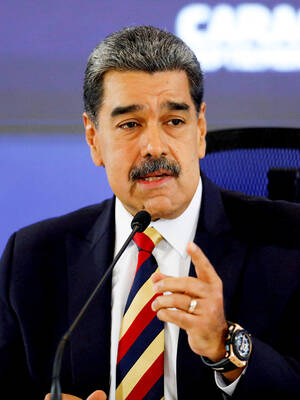Vietnam yesterday faced criticism from the US and rights groups after jailing three pro-democracy bloggers weeks ahead of the National Congress of the Communist Party of Vietnam.
The run-up to a leadership transition later this month is a particularly tense period for the government as candidates jostle for power behind closed doors.
In the past few months, the authoritarian regime has stepped up its crackdown on dissent and has arrested numerous critics.
At a quick trial on Tuesday in Ho Chi Minh City, three critics of the government who belong to the outlawed Independent Journalists Association of Vietnam (IJAV) were sentenced to jail for “making and disseminating information against” Vietnam.
Writer Pham Chi Dung, 54, founding member and president of IJAV, was jailed for 15 years, while military veteran Nguyen Tuong Thuy, 69, was sentenced to 11 years.
A younger member of the group, Le Huu Minh Tuan, was also handed an 11-year term.
The US — which, despite war memories, has a warming relationship with Vietnam led by shared concerns on China — said it was “disappointed” by the sentences.
“These harsh sentences are the latest in a worrisome trend of arrests and convictions aimed at Vietnamese citizens exercising rights enshrined in Vietnam’s constitution,” a US Department of State spokesperson said in Washington.
“We urge the Vietnamese government to ensure its actions are consistent with the human rights provisions of its constitution and its international obligations and commitments,” the spokesperson said.
The imprisoned trio are well-known for calling for greater democracy in Vietnam.
Lawyer Nguyen Van Mieng told reporters that they admitted writing articles “to support freedom of speech and other democratic rights,” but denied spreading information against the communist regime.
According to the court’s verdict cited by state-run media, the three “had regularly been in contact with regime opponents” prior to their arrests in late 2019 and the middle of last year.
Dung had written articles for foreign media agencies with “the purpose of changing Vietnam’s political system,” it said.
The defendants’ behavior posed “a danger to society ... causing separation in social unity and people,” it added.
Amnesty International deputy regional director Emerlynn Gil said the sentences showed the depths of Vietnam’s censorship “even by its own deeply repressive standards.”
“These journalists’ only crime was daring to discuss politics and other matters of public interest,” she said.
Radio Free Asia, the US government-funded broadcaster where Thuy contributed commentary, called for his immediate release.
“The harsh sentencing of Thuy and two other independent journalists is a blatant assault on basic freedoms and flies in the face of the freedom of expression enshrined in Vietnam’s constitution,” Radio Free Asia president Stephen Yates said.
There are more than 170 prisoners of conscience imprisoned in Vietnam, Amnesty has said.
Last month, writer and poet Tran Duc Thach was sentenced to 12 years for his articles critical of the government posted on Facebook, nearly a decade after being released from prison for a similar offense.
The party congress is to take place from Jan. 25 to Feb. 2 in Hanoi.

‘NEO-NAZIS’: A minister described the rally as ‘spreading hate’ and ‘dividing our communities,’ adding that it had been organized and promoted by far-right groups Thousands of Australians joined anti-immigration rallies across the country yesterday that the center-left government condemned, saying they sought to spread hate and were linked to neo-Nazis. “March for Australia” rallies against immigration were held in Sydney, and other state capitals and regional centers, according to the group’s Web site. “Mass migration has torn at the bonds that held our communities together,” the Web site said. The group posted on X on Saturday that the rallies aimed to do “what the mainstream politicians never have the courage to do: demand an end to mass immigration.” The group also said it was concerned about culture,

CRACKDOWN: The Indonesian president vowed to clamp down on ‘treason and terrorism,’ while acceding to some protest demands to revoke lawmaker benefits Protests in Indonesia over rising living costs and inequality intensified overnight, prompting Indonesian President Prabowo Subianto to cancel a planned trip to China, while demonstrators reportedly targeted the homes of the finance minister and several lawmakers. Rioters entered Indonesian Minister of Finance Sri Mulyani Indrawati’s residence near Jakarta early yesterday, but were repelled by armed forces personnel, Kompas reported. Items were taken from the homes of lawmaker Ahmad Sahroni and two others, according to Detik.com. The reports of looting could not be independently verified, and the finance ministry has not responded to requests for comment. The protests were sparked by outrage over

VENEZUELAN ACTION: Marco Rubio said that previous US interdiction efforts have not stemmed the flow of illicit drugs into the US and that ‘blowing them up’ would US President Donald Trump on Wednesday justified a lethal military strike that his administration said was carried out a day earlier against a Venezuelan gang as a necessary effort by the US to send a message to Latin American cartels. Asked why the military did not instead interdict the vessel and capture those on board, Trump said that the operation would cause drug smugglers to think twice about trying to move drugs into the US. “There was massive amounts of drugs coming into our country to kill a lot of people and everybody fully understands that,” Trump said while hosting Polish President

A French couple kept Louise, a playful black panther, in an apartment in northern France, triggering panic when she was spotted roaming nearby rooftops. The pair were were handed suspended jail sentences on Thursday for illegally keeping a wild animal, despite protesting that they saw Louise as their baby. The ruling follows a September 2019 incident when the months-old feline was seen roaming a rooftop in Armentieres after slipping out of the couple’s window. Authorities captured the panther by sedating her with anesthetic darts after she entered a home. No injuries were reported during the animal’s time on the loose. The court in the